The first record of cricket in Belgium dates to a letter written in 1748 by the Earl of Carlisle to his friend, George Selwyn, referring to a game at Spa, in the Ardennes, in what was then part of the Spanish Netherlands.
Cricket was later played by officers of the British Army during the Napoleonic Wars. There are references to matches in Brussels in 1814 and to a match played on 12 June 1815 just before the Battle of Waterloo.
However none of these events presaged the immediate take-up of the game. Although a watercolour painting by Robert Streatfield, about 1840, shows the game still being played at Spa, cricket did not develop permanence until the formation of Brussels Cricket Club in 1865. Another picture, this time anonymous and dated 1870, shows the Bourgmestre of Brussels opening the Brussels cricket ground, in the Bois de la Cambre in 1866.
Membership of the Brussels CC and also that of the Antwerp Club, formed in 1880, was restricted to British residents. No attempt seems to have been made to encourage Belgians to take up the game, although by the turn of the century memberships of other clubs were open to selected Belgians.
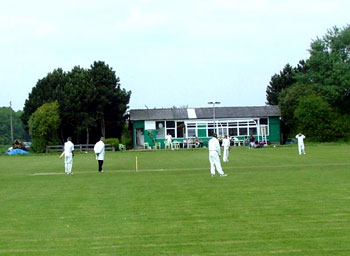 The ground at Royal Brussels CC
The ground at Royal Brussels CC
In 1905, Belgium met The Netherlands in the first of what became a regular series of internationals that lasted until 1937. Of the 21 internationals played between the two in this period, three were won by Belgium, 15 by The Netherlands, while three were drawn.
A cricket tournament was organised as part of the 1910 Brussels World Fair. By this time a few Belgians were being selected for the national side, most notably Le Comte Jean d’Oultremont who was a most enthusiastic supporter of the game. He promoted and organised matches, and perhaps for this reason, he regularly captained the team, despite being a player of limited ability. A keen sports administrator, he later became President of the Belgian Football Association.
Despite his efforts. Cricket stagnated after the First World War. The game became restricted to the Brussels and Antwerp clubs who survived, despite a rather fluid membership of short-term British and, occasionally Australian residents, by playing in the Dutch league and undertaking friendly matches against Standard Athletic Club in Paris and English club sides. It was the Brussels and Antwerp Cricket Clubs who revived the game after the Second World War, although following a change of rules in 1966 they were forced to withdraw from the Dutch league. In 1977, the heritage of the Brussels Cricket Club was recognized by royal decree, giving it the status of a Societe Royale and the title of the Royal Brussels Cricket Club.
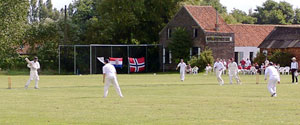 The ground at Royal Antwerp CC
The ground at Royal Antwerp CC
From the 1960s on, the population of Brussels became more international. Overseas countries set up offices through which they could perform ambassadorial links with the European Union and many multinational companies chose the city for their headquarters. The number of people interested in playing cricket increased.
The late 1970s and 1980s saw the formation of a club in Mechelen and the Pakistan Cricket Club of Belgium in Brussels. More clubs were formed in the late 1980s and in 1990 the Belgian Cricket Federation was founded. They sent a scratch side to the European Cricketer Cup competition in Guernsey in 1990, finishing second.
They were granted Affiliate status by ICC in 1991 and this provided a spur to develop a national team which has become a regular in ICC European tournaments. Like the situation before the 1914-18 War, only a few of the players were Belgian born and the rest are expatriates, mainly of Indian and Pakistani origin. They did start a development programme and many clubs have thriving youth sections. They have also participated in European youth tournaments at Under 13, 15, 17 and 19 levels.
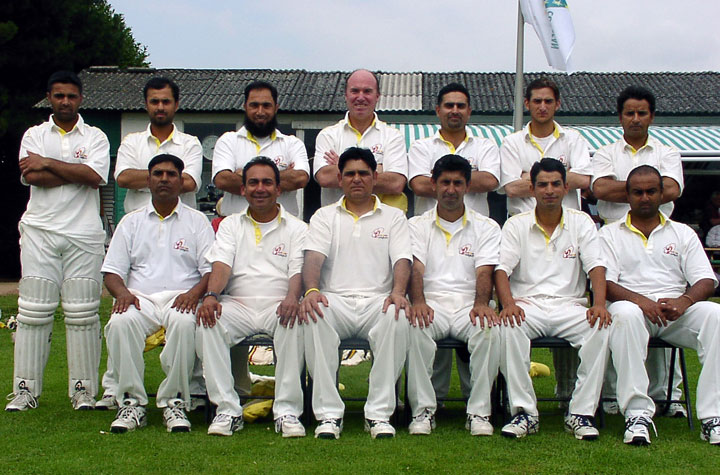 The Belgium squad at the 2005 European Affiliates Championship (© CricketEurope)
The Belgium squad at the 2005 European Affiliates Championship (© CricketEurope)
They took part in the ECC in 1999, 2001 and 2003. They didn’t win a game in 1999 but Rauf Al Sayed did score a century against Switzerland. They fared better in 2001 in Austria where they reached the semi-finals beating Croatia, Greece and Switzerland, but were beaten by Austria and Portugal, despite five wickets by Nadeem Khan against the latter. In 2003 they finished sixth.
Belgium 1999 squad. Sven Tahri, Peter Allaerts, Koenraad De Grooth, Ben Gallet, Kurt Osaer, Xavier Winderickk, Faisal Rafi, Ala Abdul, Rauf Al Sayed, Wasantha Medagoda, Richard Eames, Bhushan Gothoskar, Khan Nadeem.
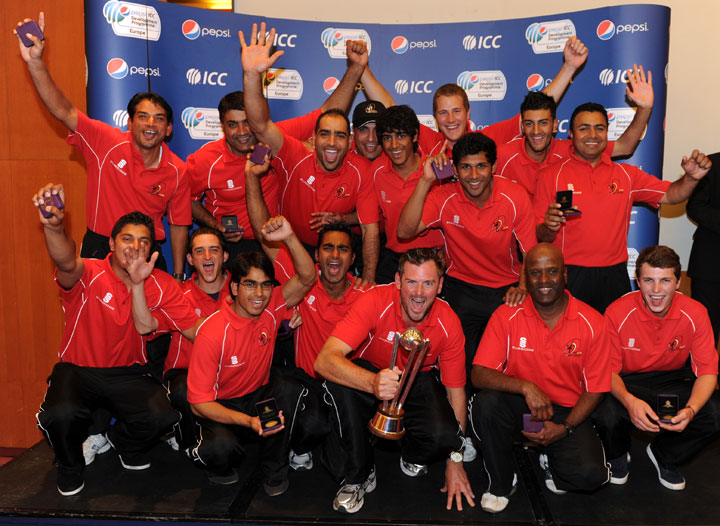 The Belgium squad which won the 2011 European Division 2 Championship (© CricketEurope)
The Belgium squad which won the 2011 European Division 2 Championship (© CricketEurope)
They proved a popular venue for European tournaments given its location as a transport hub, and with Ken Farmiloe proving an excellent tournament organizer. They hosted the 2005 European Affiliates tournament finishing fourth out of the nine sides, and received good news when confirmed that they had been granted Associate status by ICC.
They hosted Division Three again in 2007 and finished fifth, while in 2009 they were fourth, the highlight being Shahid Muhammad taking five wickets against Portugal.
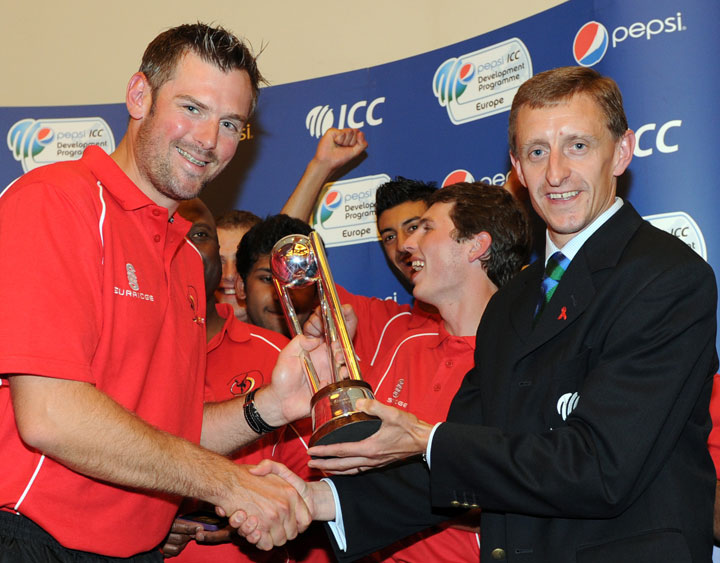 Belgium captain Andre Wagener with the European Division 2 trophy in 2011 (© CricketEurope)
Belgium captain Andre Wagener with the European Division 2 trophy in 2011 (© CricketEurope)
They tasted success when they swept all before them to win the 2011 European Division Two title on home soil, winning all seven matches played. That enabled them to take part in the Division One competition the same year, held in Jersey and Guernsey. They acquitted themselves fairly well winning four matches to finish 7th out of 12 teams. Faisal Khaliq with 14 wickets was their stand-out performer, finishing third in the overall bowling aggregate list.
2012 saw them dip their toes into the World Cricket League, winning the European qualifier to get the Division 8 slot. Abdul Rehman scored a century, Charles Wright took five wickets against France, while Jamie Farmiloe hit 62 in a crucial one-wicket win against Gibraltar. They then travelled to Samoa where they beat Suriname and Bhutan but lost to Vanuatu and Japan to end fourth. Highlights were Faisal Khaliq taking five wickets against Japan, while Abdul Rehman and Jamie Farmiloe both made half centuries against Suriname.
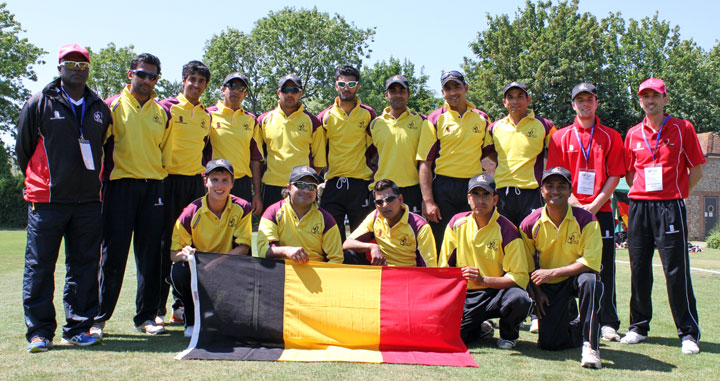 The Belgium team which beat Germany by 11 runs in the 2013 European Division 1 Championship (© CricketEurope)
The Belgium team which beat Germany by 11 runs in the 2013 European Division 1 Championship (© CricketEurope)
Back in European competition they endured a miserable 2013 tournament in Sussex finishing last of the twelve sides, but bounced back in 2014 winning Division Three in La Manga getting promoted to Division Two held in England in an attempt to save money.
They took part in Division One in The Netherlands in both 2017 and 2018, winning one match in the 2017 event and two in the 2018 competition.
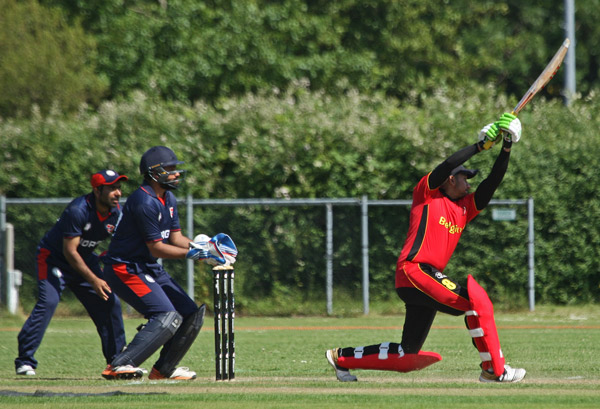 Belgium's Mamoon Latif hits out against Norway in the 2017 European Division 1 encounter (© CricketEurope/Sander Tholen)
Belgium's Mamoon Latif hits out against Norway in the 2017 European Division 1 encounter (© CricketEurope/Sander Tholen)
In 2019 they played their first T20 internationals as they hosted a three-match series against Germany, unfortunately losing all three games. They fared better in 2020 as they, Luxembourg and Czech Republic played a tri-series. Shahreyar Butt hit 81 in the first win over Luxembourg and followed it up with 125 from 50 balls (11 fours, 9 sixes) against the Czechs. They won their return matches too to complete a clean sweep.
These four victories place them at 46th in the official ICC rankings.
This article was first written by Roy Morgan in 2006 and has been updated by CricketEurope.

